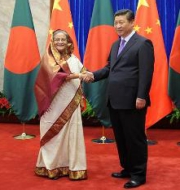Bangladesh, China agree to elevate their ties to strategic partnership
Bangladesh and China have agreed to elevate their bilateral relations to “strategic partnership”. It was announced during Chinese President Xi Jinping’s visit Bangladesh.
This is the first official state visit by Chinese head of state to Bangladesh in three decades since President Li Xiannian’s visit in March 1986.
Highlights of Chinese President Xi Jinping’s visit
- The two countries also have agreed to jointly advance China’s One belt and road (OBOR) initiative. With this Bangladesh, formally joined China’s OBOR initiative.
- They also agreed to establish institutional cooperation in areas of maritime issues and counter-terrorism.
- They also agreed to increase high level exchanges and strategic communication between them.
- Both countries signed of 26 agreements on different sectors. Through these agreements consensus was reached to work together in trade and investment and other key areas such as infrastructure, energy and power, agriculture, ICT and transportation.
Comment
- Geo-politically, Bangladesh is witnessing growing rivalry between China and India, particularly in the era of weakening US role in the region. In this scenario, it signifies growing importance of the Bangladesh in South Asia’s economics and geo-politics.
- Bangladesh maintains very strong military ties with China. Even Bangladesh’s economic relations with China have traditionally been dominated by trade. The bilateral trade between China and Bangladesh was about $12.5 billion in 2014 and Bangladesh’s export to China has not exceeded even $1 billion.
- However, in this new type of emerging big power relationship in the South Asia region relatively smaller countries like Bangladesh are adjusting and maintaining balanced economic and geo-political relations, particularly with China and India.
What is One Belt, One Road (OBOR) Initiative?
- OBOR initiative is China’s ambitious development strategy and framework focuses on connectivity and cooperation among countries primarily between China and rest of Eurasia.
- It consists of two main components, the land-based “Silk Road Economic Belt” (SREB) and oceangoing 21st Century “Maritime Silk Road” (MSR).
- OBOR initiative part of China’s revived 21st century Silk Road diplomacy that seeks to push it to take a bigger role in global affairs as a major global power.
Month: Current Affairs - October, 2016



